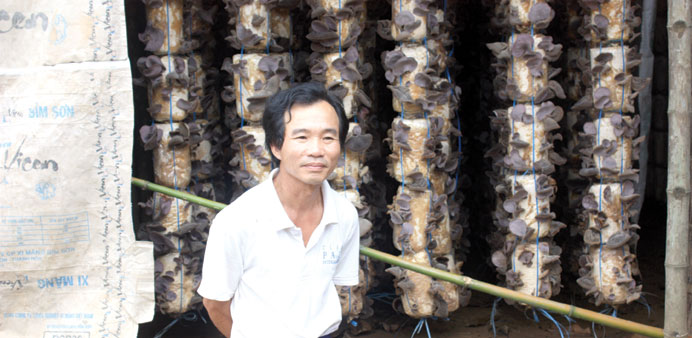By Marianne Brown
Nguyen Ngoc Thu’s prosthetic limb is so worn down it cuts off at the ankle. The scarred piece of plastic has taken the place of his right leg since he was weeding his cassava plants in 1995.
“My hoe hit a mortar,” the 48-year-old said. “There was a huge explosion and I blacked out. My neighbours called the ambulance and I woke up in hospital.”
Thu has struggled to support his wife and two daughters with a small plot for growing rice, bananas and pepper, earning less than 19 dollars a month. But he now hopes a new crop will help lift him out of poverty. With the help of a non-profit organisation called Project Renew, Thu is growing mushrooms.
Thu lives in Quang Tri province, located just below the former demilitarised zone and a hotspot for battle during the wars with France and the US. Here contamination by war-time unexploded ordnance, known as UXO, is estimated at around 80%, while in most of the rest of country the average is 20%.
Project Renew has helped clear UXO in the province for over ten years. Their most recent innovation is to set up a mushroom farming scheme to help victims of UXO and their families. After years of experimenting, 144 households will harvest their crop at the end of March.
“We tried to do something new here and also growing mushrooms does not require hard work for families because what we do here at the mushroom centre is the difficult one,” programme manager Ngo Thien Loi said.
At a small laboratory in the centre, staff place rice grains or cassava bark infused with mushroom spawn into sterilised bags of rubber-tree sawdust. They cultivate mostly Oyster, Wood-ear and Linghzi, a kind of mushroom popular in traditional medicine. Each bag weighs 1kg and can produce 500g of mushrooms.
Renew provides training and builds a standard grow house for farmers to hang the blocks. The grow house costs $600, of which farmers must provide $100.
“It means they have ownership of the house, so they take care of the house,” explained Ngo Xuan Hien, head of communications at Renew.
After 30 days the bag should turn white as the spawn grows. Farmers cut 10 holes in the bags and wait another 15 days for the mushrooms to grow through the holes. All the farmers need to do is cut the holes and water regularly.
“It’s suitable for me because I can work at home, and inside the house,” said veteran mushroom farmer Do Thien Dang. “My life is much better.”
The 53-year-old lost both his legs when he stepped on a landmine when harvesting bamboo near his home in 1980. He took part in the pilot mushroom programme in 2003 and now produces 250-300kg of mushrooms per year, contributing up to $300 to the family coffers.
Via Renew’s no-interest loans, farmers under the scheme usually buy around 1,500 blocks for 15 US cents each. Renew then buys the crop back at slightly higher than market price and sells it at local markets. Profits go towards mine clearance.
It hasn’t been entirely plain sailing. The pilot project in 2003 largely failed because farmers didn’t have the expertise to cultivate spawn themselves and in 2011 all the mushroom blocks were wiped out by disease from their source in South Vietnam.
But despite these hurdles, the project is optimistic and in 2012 they set up a brand name, NAMUS, with the intention of selling the product outside the province and even abroad what when they harvest is big enough. By 2015 they want to expand to 1,000 families.
Dang didn’t work for over two decades between the date of his accident and the Renew project because of his disability. UXO haunts most of the population in varying degrees. The latent threat of explosions keeps the province poor, says technical advisor for the Mines Advisory Group (MAG), Henk Liebenberg.
“Any land that’s say going for development of a school, market, has to be cleared first and if that process has not been done then the development can’t take place so it slows down.”
Liebenberg said families often know where items of UXO are buried so they avoid cultivating that area. As soon as that item is removed they can use the land to make money. “So yes, it does take food out of their mouths,” he said.
Five non-governmental organisations (NGOs) work in the province clearing mines and supporting UXO victims, but experts say the problem will remain for generations to come. For that reason the issue is learning how best to live with it, and mushrooms are one way to alleviate the burden. — DPA

* Double amputee Dang has been farming mushrooms since 2003.
